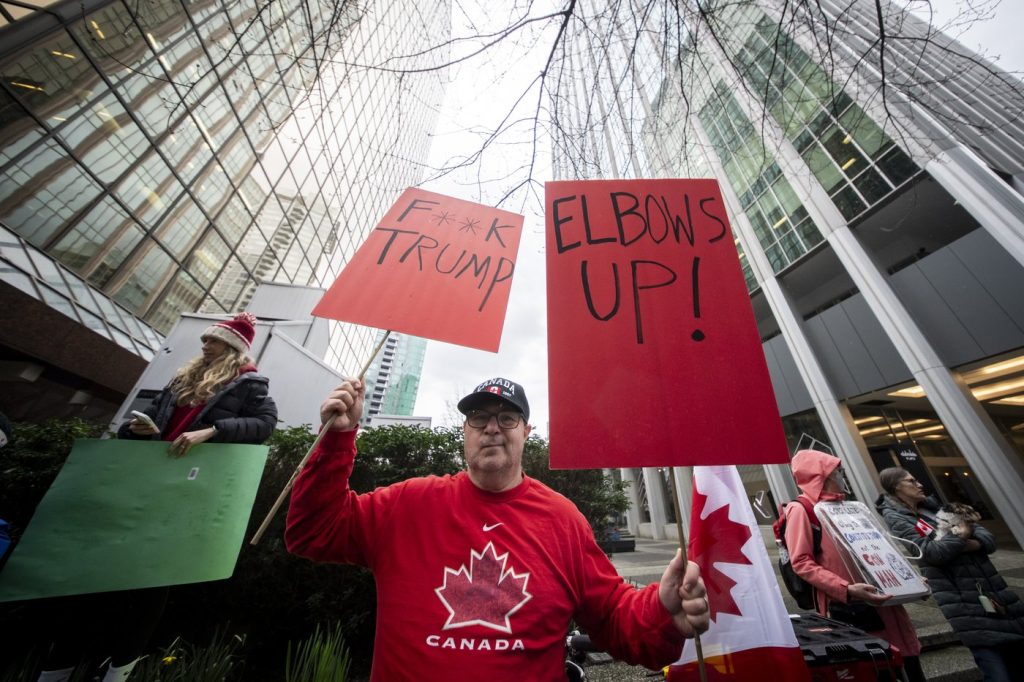The ongoing trade tensions between Canada and the United States have recently escalated, particularly affecting the bourbon industry. British Columbia (B.C.) Liquor Stores have listed numerous Kentucky bourbons, ranging from a $5.29 two-ounce bottle of Maker’s Mark to a $2,400 Woodford Reserve in a crystal decanter. However, all these bourbons are currently marked as "unavailable" due to provincial government actions taken in response to U.S. tariffs imposed by President Donald Trump on Canadian imports.
This strategy of banning U.S. alcohol has gained traction among various Canadian provinces and territories, serving as a retaliatory measure in the escalating trade war. According to Samuel Roscoe, a lecturer at the University of British Columbia’s Sauder School of Business, provinces like British Columbia are leveraging their control over alcohol sales to counteract the financial impacts of American tariffs and to convey that such tariffs are unjust and detrimental to both countries.
Roscoe emphasized that the prohibition of U.S. alcohol is a noteworthy tactic that can grab the attention of U.S. companies, illustrating how tariffs can trigger trade wars, an outcome detrimental to previously strong trade relationships. Unlike many other goods, which the government cannot easily regulate, the alcohol sector offers a unique avenue for provinces to retaliate against perceived unjust trade measures.
Several provinces, including Ontario, Quebec, and Alberta, have placed a ban on American alcohol, with B.C. targeting products from states that supported Trump in the last election. The provincial government estimates that these actions could lead to an annual loss of approximately $40 million for manufacturers in states whose officials are in favor of the tariffs.
This situation has prompted reactions from American officials, particularly from Kentucky Governor Andy Beshear, a Democrat whose state has a significant bourbon industry. Beshear has publicly voiced his concerns regarding the tariffs, highlighting the potential adverse effects on the bourbon sector, which generates over $9 billion in economic output annually and supports more than 23,000 jobs in Kentucky. He warned that these tariffs could lead to increased costs for essential goods like gas, groceries, and housing across the United States.
During a recent news conference, B.C. Premier David Eby acknowledged Kentucky's concerns about the Canadian alcohol ban. He noted that not only were they worried about Canada's actions but also potential boycotts from Mexico and the European Union. Eby stated that the removal of American products such as Florida rum, Texas vodka, and Tennessee whiskey from B.C. shelves would send a clear message to Trump's allies about the intertwined nature of trade relationships between Canada and the U.S.
However, some experts argue that a blanket ban on American alcohol may not be the most effective strategy. Michael Devereux, a professor at the University of B.C.'s Vancouver School of Economics, suggested that imposing reciprocal tariffs on U.S. goods could generate revenue for B.C. and be a more equitable response. He criticized a prohibition that might only upset producers in the states affected by the ban without achieving tangible results against the tariffs.
Contrarily, Roscoe mentioned that outright bans on American alcohol by other provinces could have a more substantial retaliatory effect than B.C.'s focused approach. Nonetheless, he pointed out that many Canadians are already choosing to avoid U.S. products in light of the tariffs and Trump's provocative remarks, which bodes ill for American alcohol companies beyond just governmental actions.
In terms of maintaining relationships with neighboring "blue" Democratic states, Roscoe indicated that the damage had already been done by Trump's administration, suggesting that Canadian public sentiment remains largely against the current U.S. leadership, overshadowing concerns about individual states.
This situation underscores the complexities of international trade relationships and the significant economic interdependence between Canada and the United States, revealing how retaliatory measures can quickly escalate and affect industries on both sides of the border.










